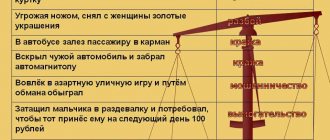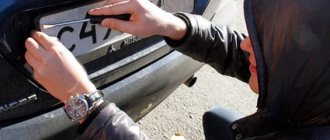Important! If you are handling your own theft case, you should remember that:
- Each case is unique and individual.
- Knowledge of the laws is desirable, but does not guarantee a solution to your particular problem .
- The possibility of a positive outcome depends on many factors .
Get a free consultation with a lawyer with the support of the Ministry of Justice of the Russian Federation
The appropriation of someone else's property in any form is a crime that may result in criminal liability. Often the average person hears the words “theft,” “theft,” and “theft,” considering them to be one and the same act. In fact, reality looks different, although these concepts are really very close.
Theft is a separate criminal offense, which is one of the types of theft. The latter term combines several offenses that may result in liability in accordance with the Criminal Code of the Russian Federation. And the difference between them is significant. Accordingly, the defense of the defendant has its own specifics. Trying to defend yourself in such cases is absolutely useless, so you cannot do without the help of a lawyer. If you need the support of a lawyer, our specialists are ready to help.
What is it and what is the difference?
The difference between the concepts of theft and theft is quite significant; you need to know about the features of each type of seizure of someone else's property. This is important because the fairness of the punishment depends on the correct qualifications. Let's look at each of them in more detail.
Theft
Theft is a type of property crime. The main difference between this type of offense and others related to theft is that it is committed secretly. The punishment comes under Art. 158 of the Criminal Code of the Russian Federation.
Note!
The victim discovers the fact that things are missing after the fact, and in this case nothing threatens her life and health.
In some cases, the act may be committed even in the presence of the owner of the thing. However, an important condition is that the owner or others are not aware of the criminal nature of what is happening.
The theft is considered completed as soon as the citizen who has committed the offense has the opportunity to dispose of other people's property at his own request.
Theft
This concept is nothing more than a synonym for theft. The Criminal Code of the Russian Federation does not distinguish between these terms, and there is no separate article for theft. As a rule, it is called petty theft.
Responsibility for them is provided for by the Code of Administrative Offenses of the Russian Federation and the Criminal Code of the Russian Federation. The border between them is the amount provided for by current legislation for the qualification of crimes. It is 2500 rubles. At the same time, the Code of Administrative Offenses of the Russian Federation specifies different sanctions for thefts of up to 1000 and up to 2500. If the damage does not exceed 1000 rubles, the attacker faces a fine of up to five times the value of the stolen property, but not less than 1000 rubles, arrest for up to 15 days or compulsory work for up to 50 hours.
If the damage ranged from 1,000 to 2,500 rubles, one of the following penalties will be imposed: a fine of up to five times the value of the stolen property, but not less than 3,000 rubles, arrest from 10 to 15 days, or compulsory labor for up to 120 hours.
Theft
Theft is a concept that combines several acts. The definition of an offense contained in the Criminal Code of the Russian Federation is as follows: “illegal gratuitous receipt of someone else’s property, associated with causing damage to the owner and implying a selfish goal.” The crimes united by this concept include:
- theft;
- robbery;
- robbery;
- fraud and others.
Note!
It is necessary to distinguish between theft and, for example, the seizure of the debtor’s property to pay off the debt. The latter does not imply self-interest. The person receiving the property is not enriched, but receives compensation for the service rendered. In the case of theft, there is a clear thirst for profit.
Types of property that can be stolen
Russian legislation stipulates encroachments on three types of property:
- Physical. The appropriation of someone else's material object that has its own form, that is, it must be in one of three physical states (solid, liquid, gaseous), and it can be either inanimate or animate, for example, a pet. Taking this into account, actions related to encroachment on other people’s ideas and thoughts, if they are not embodied in a specific object, will not be charged as “theft”; acts of this nature are considered in Articles 146, 147 of the Criminal Code of the Russian Federation as misappropriation of copyright.
- Economic. The stolen object has its own specific price; human labor was used to create it. Therefore, natural resources in their natural state cannot be considered an object of theft until human labor is invested in them. For example, cut down trees, caught fish or animals are already objects of theft, since socially useful labor was used to carry out these actions; accordingly, this property already has its own specific use value, and in the event of “theft,” the attacker will be able to satisfy his needs and enrich himself.
- Legal. Property rights are affected here, that is, the stolen property is in the possession of an individual or legal entity, the state. For example, if the property was only supposed to come into the possession of a citizen and, as a result of the malicious intent of the criminal, did not become the property of the person, this act is not “theft”, but is qualified as causing property damage through deception or abuse of trust in accordance with Article 165 of the Criminal Code of the Russian Federation .
What is the difference?
The main difference between theft and embezzlement is that the first act is only a form of theft. It includes a range of crimes that differ significantly in nature but have a common goal.
Let's look at a few more characteristics that clearly demonstrate the difference between the concepts:
- nature of the crime.
The difference between theft and theft is that the first crime is always carried out covertly. In the second case, open illegal seizure of property is possible;
- possibility of bodily harm.
Theft does not involve injury. In the case of other types of theft, this is possible;
- the possibility of voluntary withdrawal of an item.
In some types of theft, the victim may hand over the items if threatened.
Another difference is the length of punishment. In the most severe case, theft can carry up to 10 years in prison. As for theft, the maximum sentence can be up to 15 years in prison.
Robbery and its differences from theft
Robbery is the open theft of property, that is, the person committing the robbery steals openly, for example, snatching a bag from his hands or tearing jewelry from his neck. In this case, the criminal has the intention of committing daring, open theft; this directly implies that the perpetrator knows that his actions are obvious to the victim. Robbery can also be simple or skilled, that is, committed under additional conditions, such as, for example, the threat of violence.
Everything seems to be easy and simple, the differences are visible to the naked eye. However, these crimes often make investigators think about qualifications. For example, a thief entered an apartment, thinking that there was no one there, but the owner was in it and watched the actions of the villain on the sly.
Or in a similar situation, two thieves entered an apartment with the intention of committing theft. One was operating in the first room, where he accomplished his plan without being noticed by the owners of the apartment, and the second intruder was noticed by the awakened owner and, so that he would not prevent the thief from fulfilling his plan, the latter hit him.
The question arises: what crime did the two criminals commit, because the first did not know that the second was discovered and used violence? In this case, the first one committed theft, and the second one committed robbery. In the science of criminal law, this situation is called the excess of the perpetrator, that is, to commit the robbery was a personal decision of the criminal, not included in the plans of his accomplice.
Punishment for each of these crimes
Each of the crimes classified as “theft” provides for different penalties. Let's consider the minimum and maximum options:
- theft (Article 158 of the Criminal Code of the Russian Federation).
In the case of an act without aggravating circumstances, the court may impose a fine of up to 80,000 rubles. or in the amount of the offender’s income for six months. Restriction or imprisonment for up to 2 years is possible. The court can also impose up to 1 year of correctional labor, up to 2 years of forced labor, or up to 360 hours of compulsory labor. Possible arrest for 4 months;
- robbery (Article 161 of the Criminal Code of the Russian Federation).
A sentence of 480 hours of correctional labor is the mildest punishment. If the robbery was committed without aggravating circumstances, a suspended sentence may be imposed. In extreme cases, the court may resort to such punishment as imprisonment for a period of 4 years;
- robbery (Article 162 of the Criminal Code of the Russian Federation).
The minimum punishment for such acts is forced labor for up to 5 years. According to paragraph 1 of Art. 162 of the Criminal Code of the Russian Federation, the sanction is up to 8 years in prison. A fine is also possible. The maximum amount is 500,000 rubles
In the most severe case, the offender faces a term of 8 to 15 years, served in a maximum security colony. A fine may also be imposed, the amount of which will be up to 1,000,000 rubles. Additionally, the court may impose a sentence of restriction of freedom for up to 2 years.
To get the most detailed advice on your issue, you just need to follow any of the suggested options:
|
Theft
Theft is usually called one of the types of theft of someone else's property, committed by a subject in order to obtain a certain material benefit . An act of this kind can be committed either in the absence of the owner or in the presence; in the latter case, the theft occurs unnoticed by the owners.
Forms of theft:
Explicit . A person steals something in the presence of witnesses.
Hidden:
- The theft occurs in the absence of the owner.
- In the presence of the owner, unnoticed by the latter.
- In the presence of witnesses who do not realize the illegality of the thief’s actions, since they have no idea whether the thing belongs to him or not.
- In the presence of owners who cannot understand what is happening (sleeping, fainting, very drunk, mentally ill, and so on).
- The theft is carried out under the watchful gaze of witnesses, but they do not give themselves away.
What do lawyers mean by embezzlement?
Illegal seizure of property from the owner in various variants represents a single set. This general concept in jurisprudence is called theft. The objects of the crime are products that are valued at market value.
The differences between theft and theft are determined by the characteristic features of the case:
- the complexity of the nature of production;
- degree of illegality;
- gratuitousness;
- level of damage caused.
If self-interest is indicated in the committed act, then the classification of the crime will be given. Based on the motives and collected evidence, it becomes clear to the investigation how theft differs from theft: there are criteria, the severity of the offense is emphasized.
When property is taken to pay off a debt, but the thieves do not do this to enrich themselves, but consider it the return of their property, they are engaging in arbitrariness. The law threatens these violators with other liability.
An example from judicial practice
Citizen Ivanov, while in a grocery store, decided not to pay for the goods he needed.
While trying to secretly carry out food, Ivanov was caught red-handed.
Such theft is classified as theft, based on the fact that Ivanov intended to remove property belonging to the store secretly.
Bearing in mind the fact that the total amount of goods that the offender tried to take out was 1,200 rubles, as well as the fact that Ivanov was law-abiding, the court decided to assign a preventive measure to Ivanov in accordance with Part 2 of Article 7.27 of the Code of Administrative Offenses of the Russian Federation.
In the modern world, thefts occur every day. The circumstances of these thefts are extremely different, therefore, for adequate legal proceedings in cases involving theft, it is necessary to know a clear difference between the various types of such crimes.
Now petty theft is punishable by criminal charges, not administrative charges!
✨ Summary
Theft is the secret theft of someone else's property. It is secrecy that distinguishes theft from other forms of theft. If the value of the stolen property is less than 2,500 rubles, then administrative liability arises.
If the value of the stolen goods exceeded 2,500 rubles, criminal liability follows. Depending on the degree of damage caused and the severity of the crime, the punishment can be either a large fine or actual imprisonment.
From misappropriation or embezzlement
There is a difference between theft and embezzlement , are different from theft.
These crimes are characterized by entrusting the perpetrator with subsequently stolen or embezzled property.
Most often, these crimes are associated with the use of official or official position , when a person manages funds that do not actually belong to him.
An equally interesting structure, different from theft, and from robbery and robbery, is extortion.
Here, the requirement to transfer the desired property to persons with illegal intentions is confirmed by threats to life or health, or by destruction or damage to property.
What to do if you are caught shoplifting
If you are detained in a store on suspicion of theft, then security officers do not have the right to search you or force you to open your bag, empty your pockets, etc. They are obliged to call the police, who will carry out all the necessary procedures themselves.
Store security guards do not have the right to search you, even if they saw you hiding stolen goods.
First, law enforcement officers will offer you to return the stolen goods voluntarily. If you refuse, you will be examined by a police officer in the presence of witnesses.
Also read: How to write a statement about phone theft to the police: the correct sample
If the fact of theft is confirmed, administrative proceedings will be initiated and a protocol will be drawn up, and the case will be transferred to the magistrate's court.
An administrative case may also be initiated if you left the sales area with unpaid goods not on purpose, but due to inattention or absent-mindedness. Therefore, it is better to try to resolve the situation peacefully - pay for the goods and apologize to the store employees.
To avoid prosecution for petty theft, it is better to apologize to the store employees and return the goods.
Intentional damage to goods is also a form of theft. Customers often eat bulk items, open a pack of chips or a box of juice, and thereby cause material damage to the store.
But to charge store employees with theft, there must be compelling reasons:
- absence of payment for hidden goods;
- video recording of the moment when the attacker approached the object and hid it.
Therefore, be careful and pay for the items and products you purchased.
What the law says
According to the legislation of the Russian Federation, theft of up to 1000 rubles is an administrative violation and is classified as petty theft. This offense is regulated by the Code of the Russian Federation on Administrative Offenses.
There is one nuance that elevates this kind of theft to the category of crimes. Namely, that the thief must have time to use the stolen goods before the fact of the offense is discovered. In other words, the crime must be completed.
For example, if the offender managed to eat a product stolen from a store, then the crime is considered committed. If this product was seized by security officers, the thief can evade punishment.
How to find out the value of stolen property
The total value of the stolen goods is determined according to average market prices. Sometimes experts are brought in to conduct assessment procedures.
Please note that the amount of stolen goods is calculated based on the actual value of the stolen goods, i.e. at the purchase price. The store's markup is not included in the calculations.
Example : if you stole a bottle of cognac for 1800 rubles, and the store purchased it at a price of 850 rubles, then such an act will not qualify as a criminal offense. It is considered an administrative offense.
The amount of the stolen goods plays a major role in determining liability - administrative or criminal.
From theft
for liability for theft and theft of a vehicle
Most often, criminal cases under this offense are initiated specifically for theft, unless we are talking about a car stored in a garage .
The difference in interpretations is quite simple: theft involves the unlawful taking of a car without the purpose of making a profit from it, i.e. without further dismantling or resale.
If the car is considered by the thieves not as a vehicle for moving around the city, but as a source of profit, then we are talking about theft.
It is difficult to talk about the intent of criminals in their absence, therefore competent qualification here fully depends on the testimony of the suspects and the actions they committed.
The most common thefts
People who seek to enrich themselves in a short period of time at the expense of others resort to theft of other people's property.
Thefts are happening everywhere. Wallets and mobile phones are often stolen on public transport.
In museums, paintings by great artists are stolen and removed under the pretext of restoration of the painting. Subsequently, the “restored” masterpieces replenish private collections and delight the eyes of rich people who buy them for huge sums of money.
Burglar thieves strive to find money and jewelry in apartments; they also do not mind profiting from household appliances, food, telephones, computers, fur items, antiques - in a word, everything that they can get their hands on.
Many people who commit theft believe that from the moment they take possession of someone else's stolen property, they can do with it as they please. As a rule, all stolen items are sold on the black market, or replenish the numerous stocks of pawn shops, where they lie collecting dust on the shelves.
How to prevent shoplifting
The goal of shoplifting prevention is not to catch the criminal, but to prevent the theft from occurring. To do this, the supermarket management is recommended to use the following protective equipment:
- Install a modern and high-quality 24-hour video surveillance system with the ability to record and view online. This will allow you to constantly monitor every corner of the store and prevent thieves from wanting to steal.
- Installation of anti-theft systems that will be triggered whenever intruders try to steal something. Since the risk of being caught in this case will be high for criminals, they will stop such actions in this store.
- Hire highly qualified security guards who will monitor suspicious persons and prevent theft.







